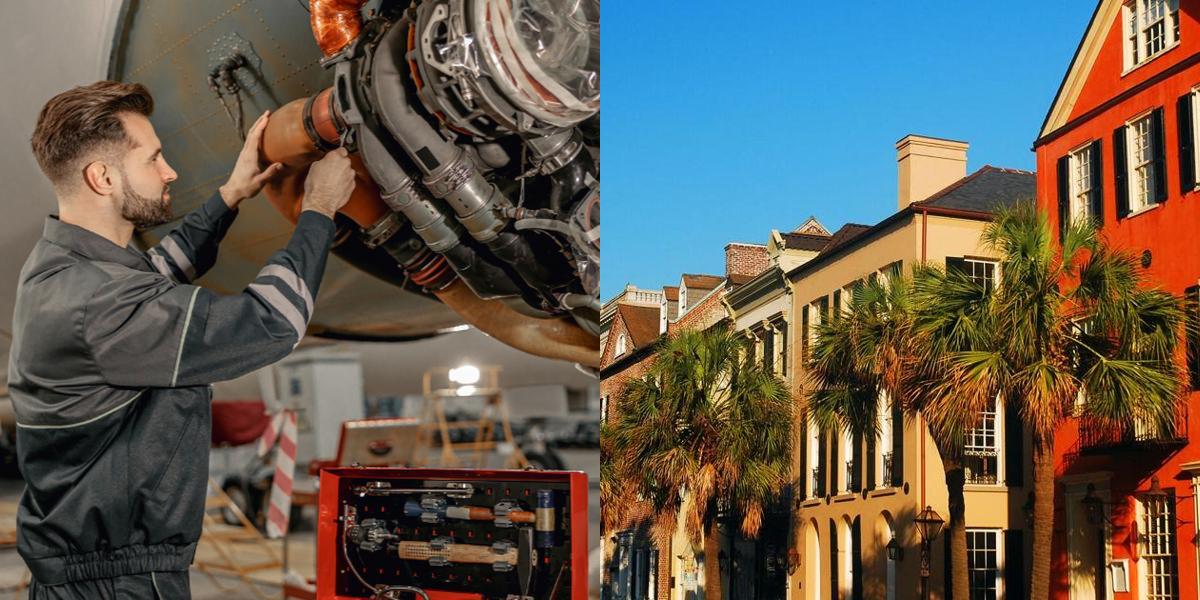How to Become an Aviation Mechanic in South Carolina

Aviation mechanics play a crucial role in ensuring the safety and efficiency of aircraft. They are responsible for inspecting, maintaining, and repairing aircraft, including engines, electrical systems, and other crucial components. If you have a passion for aviation and enjoy working with your hands, a career as an aviation mechanic in South Carolina may be a perfect fit for you.
4. Consider Apprenticeship Programs
Some aviation maintenance companies offer apprenticeship programs for aspiring aviation mechanics. These programs provide on-the-job training and mentorship, allowing you to further develop your skills and gain practical experience. Look for companies that offer apprenticeships and apply to these programs for additional training and job opportunities.
5. Stay Updated with Industry Trends
The aviation industry is constantly evolving, with new technologies and regulations being introduced regularly. Stay updated with industry trends and advancements by reading industry publications and attending seminars or workshops. Being knowledgeable about the latest developments in the field will make you a more valuable candidate to potential employers.
6. Prepare for Interviews
Once you start receiving interview invitations, it's important to prepare thoroughly. Research the company you're interviewing with, familiarize yourself with their operations and values, and come prepared with questions to ask the interviewer. Practice common interview questions and be ready to discuss your experience and skills in detail.
7. Highlight Your Safety Record
Safety is a top priority in the aviation industry, so it's important to highlight your commitment to safety during the job search process. Emphasize your adherence to safety protocols, your attention to detail, and any safety training you have received. A strong safety record will make you a more desirable candidate to potential employers.
Career Paths and Opportunities after Becoming an Aviation Mechanic
After becoming a certified aviation mechanic, there are several career paths and opportunities available to you. Here are some options to consider:
1. Aircraft Maintenance Technician
Many aviation mechanics choose to work as aircraft maintenance technicians, performing routine inspections, repairs, and maintenance on aircraft. This role can be found in various settings, including airports, aviation maintenance companies, and aircraft manufacturing facilities.
2. Aviation Maintenance Supervisor
With experience and additional training, aviation mechanics can advance to supervisory roles, overseeing a team of mechanics and ensuring that all maintenance tasks are completed efficiently and accurately. This role requires strong leadership and organizational skills.
3. Quality Control Inspector
Quality control inspectors are responsible for ensuring that all maintenance work meets regulatory requirements and industry standards. They perform inspections and audits, document findings, and make recommendations for improvements. This role requires strong attention to detail and knowledge of aviation regulations.
4. Aircraft Manufacturing
Some aviation mechanics choose to work in aircraft manufacturing, where they are involved in the assembly and testing of new aircraft. This role requires knowledge of aircraft systems and components, as well as the ability to read and interpret technical drawings and specifications.
5. Aircraft Sales and Customer Support
Aviation mechanics with strong communication and customer service skills can pursue careers in aircraft sales and customer support. In this role, you would assist customers with their aircraft maintenance needs, provide technical advice, and help coordinate repairs and inspections.
6. Aircraft Maintenance Instructor
Experienced aviation mechanics can also pursue careers as instructors, sharing their knowledge and expertise with aspiring mechanics. This role can be found in technical schools, community colleges, and aviation training centers.
Final Thoughts
Becoming a certified aviation mechanic is a rewarding career choice for those who have a passion for airplanes and enjoy working with their hands. By following the steps outlined in this article, you can obtain your certification and start your journey towards a fulfilling career in the aviation industry. Remember to stay updated with industry trends, network with professionals in the field, and continuously work on improving your skills to maximize your career opportunities.
If this article doesn't match what you're looking for, you can check out these other articles:

Blessed Joy Amarga is part of the Growth and Sales teams at Dreambound. She helps bring in new leads, increasing the number of people at the top of the sales funnel, and supporting the team in creating graphics to boost social media engagement. Blessed is also a Licensed Architect. Outside work, she enjoys traveling and exploring new places for her vlog.



